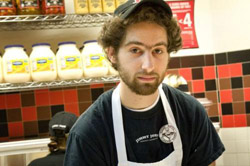Militant union takes aim at fast food - Workers at nine Jimmy John's locations will vote on joining the I.W.W.
Submitted on Thu, 10/21/2010 - 5:28pm
Disclaimer: - This article and accompanying image are reposted in accordance with Fair Use guidelines.
By Mike Hughlett - Minneapolis-St Paul Star Tribune, October 20, 2010
 As union elections go, it doesn't get much rarer than what's being served up Friday at nine Minneapolis-area Jimmy John's sandwich shops.
As union elections go, it doesn't get much rarer than what's being served up Friday at nine Minneapolis-area Jimmy John's sandwich shops.
About 185 workers are slated to choose whether they want to unionize under the banner of the Industrial Workers of the World. Organized labor is all but unheard of in the fast-food sector; most unions don't even try to make a run at burger or sandwich joints.
Of course, the Industrial Workers of the World isn't exactly a conventional union.
In its heyday in the 1910s, the IWW pioneered a fiery grass-roots style of unionism aimed at organizing workers that other unions shied away from. Its time in the limelight is long gone, but the IWW never went away and in recent years has resurfaced with a campaign to organize Starbucks workers.
The IWW has historically tended to eschew formal union elections conducted by the National Labor Relations Board, making Friday's vote at Jimmy John's particularly uncommon.
"Maybe it takes something on the fringe, like the IWW, to have the courage or craziness" to unionize fast-food workers, said John Budd, a labor relations expert at the University of Minnesota's Carlson School of Management.
The election will be held at seven Jimmy John's outlets in Minneapolis and two in St. Louis Park. All are owned by Rob Mulligan and Mike Mulligan, who declined to be interviewed. In a statement last month, they said they "take issue with the claims made by the IWW. We value our relationship with our employees and offer competitive wages and good local jobs."
Pro-union Jimmy John's workers say they want better pay and benefits, common themes in most union drives. Workers start at the federal minimum wage of $7.25, said David Boehnke, 25, who gets paid $7.90 an hour after working for about a year and a half at a Jimmy John's in downtown Minneapolis.
There are no health benefits, and when workers get sick, they have to find their own replacements, he said. "That's a big deal," Boehnke said of the latter.
Boehnke, a Macalester College graduate who's been involved in the organizing drive, said Jimmy John's workers have been meeting on Sundays for over a year to talk about a union. The IWW got the call partly because several Jimmy John's workers -- including Boehnke himself -- were already members of the union before they went to work at the sandwich shop.
Plus, "it's the only union that would even think about organizing fast food."
He's got a point there, organized labor experts say.
Fast food tends to attract young workers who may also be going to school and who don't view their job as a career gig, Budd said. "You're really not invested in the workplace." And unionizing is an investment, a process that produces stress, division and sometime recriminations from employers, Budd said.
Plus, the high turnover inherent in the fast-food industry makes unionization very difficult; pro-union workers can cycle in and out quickly. "You are constantly re-educating new workers" about the union, Budd said.
So most conventional unions view fast-food workplaces like Jimmy John's as a losing investment.
"It's normally something we wouldn't go after," said Martin Goff, senior vice president at Unite HERE Local 17, the Twin Cities union with jurisdiction over restaurants. But Goff said he welcomes the IWW's attempt at Jimmy's John's. "We like the energy these young kids have."
The Jimmy John's campaign has also gotten the backing of the Minneapolis Regional Labor Federation, an umbrella group for mainstream AFL-CIO unions like Unite HERE.
Radical beginnings
The IWW was created in 1905 as a tool to organize workers that unions of the time often ignored: unskilled immigrant factory workers and miners. It was founded by radical unionists, socialists and anarchists who believed ultimately in a general strike by all workers that would overthrow the capitalist system.
During the union's heyday before the end of World War I, it was involved in several historically important strikes, including a massive walkout by miners on Minnesota's Iron Range in 1916. After the war, the federal government cracked down on the IWW's leadership, and the group's significance waned as time went on.
The Starbucks union
Since the mid-2000s, the IWW has surfaced in attempts to organize Starbucks workers across the country. The IWW's Starbucks union has about 300 members, according to Erik Forman, a member who works at a Starbucks at the Mall of America.
The IWW has no contracts with Starbucks and hasn't conducted any union elections at the big coffee chain. But the union has taken several complaints against Starbucks to the National Labor Relations Board -- and won some settlements.
Boehnke said he's confident the IWW will post a strong showing Friday, though that outcome is far from clear.
Breon James, one of Boehnke's co-workers at the skyway location, said she's voting for the union, particularly in light of Jimmy John's sick time policies. The 20-year-old has asthma and said she can get sick "at the drop of a hat." She said she's been reprimanded by a supervisor for failing to find her own replacement.
But another of Boehnke's co-workers, Erik Dolezal, 24, said he'll do without the union. "I've got zero complaints about my job," he said. "If I wanted a promotion I feel like I could get one. I could have my own franchise if I really wanted."
Author contact - Mike Hughlett • 612-673-7003